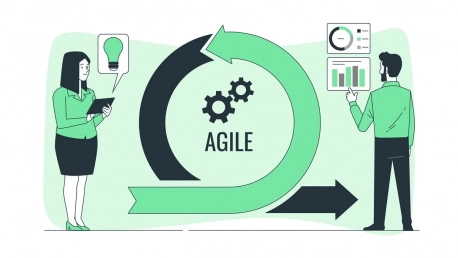In the ever-evolving landscape of software development, Agile methodology has emerged as a pivotal force. It plays an essential role in elevating the performance of development teams by fostering a culture of efficiency, adaptability, and quick response. Agile goes beyond a mere set of practices; it is a mindset shift that revolutionizes the approach to project management and execution in the tech industry.Adopting Agile allows teams to break projects into manageable units, prioritize tasks, and adapt to change rapidly, keeping pace with the industry’s rapid growth and shifting demands. This methodology encourages collaboration, continuous feedback, and iterative development, which helps in delivering value quicker and more reliably.Agile’s influence is undeniable—it’s not just a way to manage software development but a strategic approach that resets the industry’s rhythm of work, helping teams stay at the forefront of innovation.
Embracing the Agile Mindset
Agile methodology is grounded in a set of values and principles defined in the Agile Manifesto, which emphasizes collaboration, flexibility, customer feedback, and the delivery of functional software. At its core, Agile promotes an iterative approach to software development, where projects are broken down into manageable units that can be completed in short cycles called sprints. This enables teams to focus on delivering value incrementally, maintaining a sustainable pace while adapting to change. The end goal is to offer working software at the conclusion of each sprint, which not only ensures continuous progress but also allows for immediate user feedback and necessary pivots.This repeated sprint cycle is crucial for not just advancing projects but also for identifying potential bottlenecks early on. With frequent introspections and reviews, Agile teams can rapidly improve their processes, product quality, and performance. The emphasis on cooperation and open communication fosters a productive environment where all stakeholders are aligned, which in turn translates to achieving objectives with increased efficiency and reduced time to market. These teams are empowered to take ownership of their work, proactively handle challenges, and cultivate a strong sense of accountability.
Optimizing Through Iterative Development
Agile methodology revolutionized software development with its iterative approach, engaging stakeholders early and frequently. Instead of betting on a final product’s success, Agile allows for customer feedback at every stage, ensuring the end product resonates with the market. This iterative cycle not only aligns products with user needs but also mitigates risks, making complex projects manageable and adaptable to change.Agile’s flexibility is key in today’s dynamic markets, as it allows teams to pivot swiftly in response to new trends and issues, minimizing delays and overruns. The development process becomes more transparent and efficient, fostering collaboration and a proactive culture. As a result, companies can launch superior products swiftly and consistently, staying ahead in the competitive tech landscape.Agile’s approach is likely to remain indispensable, driving innovation and adeptly meeting future digital demands with its user-centric, responsive framework.









